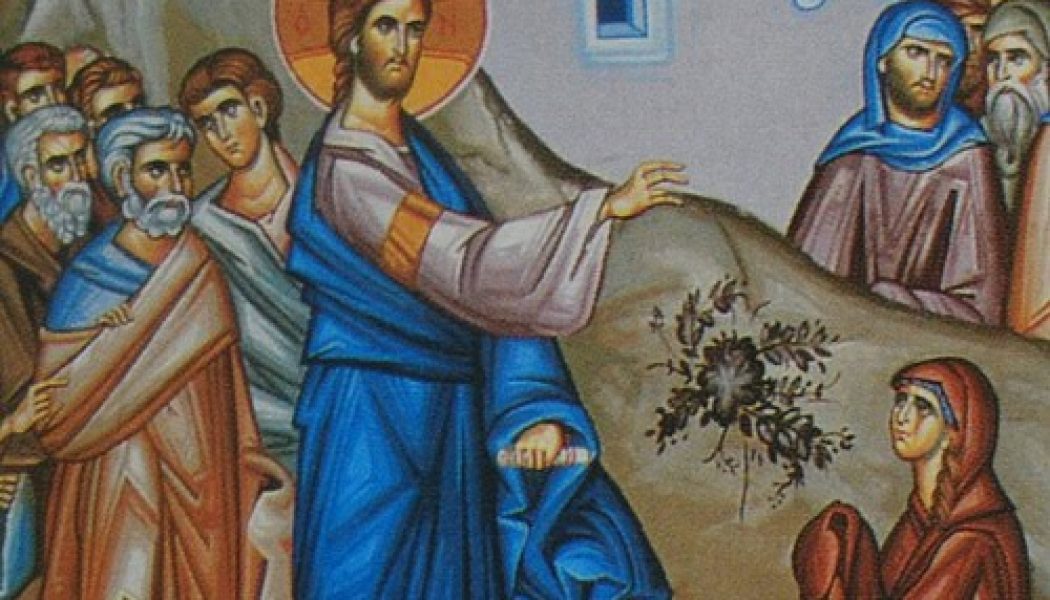
The Gospel this Sunday teaches us to pray always and not to lose heart. It is about being tenacious in prayer, continuing to beseech the Lord even when the results are discouraging. It is also about the Lord’s will to extend the Gospel to all the nations and to make the Church truly catholic.
Let’s look at this Gospel in five stages.
TRAVELS – The text says, At that time, Jesus withdrew to the region of Tyre and Sidon. Jesus goes north of Israel into the territory we know today as Lebanon.
Matthew is not just giving us a quick travelogue here. We are not interested merely in Jesus’ physical location but in what it signifies. Jesus has gone up north to pagan territory. Other things being equal, this is a rather odd destination for a Jewish preacher, but remember that Jesus is preparing the Church for a mission to all the nations. Thus it makes sense that He pushes the boundaries of the Jewish world. Jesus interacted with Gentiles and Samaritans as if to say, “The racism of a Jewish-only world must now end. The Gospel must break the boundaries of nations and races and be truly universal, truly catholic.”
This vision of the Gentiles being drawn to the Lord was actually well attested to in the Old Testament, but just as is the case today, there were some texts that were well known and others that were conveniently “forgotten” or had little effect. Consider these passages that announced the entry of the Gentiles into the Holy People of God:
- The foreigners who join themselves to the LORD, ministering to him, loving the name of the LORD, and becoming his servants–all who keep the sabbath free from profanation and hold to my covenant, them I will bring to my holy mountain and make joyful in my house of prayer; their burnt offerings and sacrifices will be acceptable on my altar, for my house shall be called a house of prayer for all peoples (Is 56:6-9).
- I will give you as a light to the nations, that my salvation may reach to the end of the earth (Is 49:6).
- Babylon and Egypt I will count among those who know me, Philistia, Tyre and Ethiopia, these will be her children and Zion shall be called “mother” for all shall be her children (Psalm 87:4-5).
- I come to gather nation of every language; they shall come and see my glory. Some of these I will take as priests and Levites says the Lord … All mankind shall come to worship before me says the Lord (Is 66:18; 23).
Hence we can see that the Jewish people’s own Scriptures spoke of a day when Jews and Gentiles together would worship the Lord and be His people.
This introductory note about Jesus’ location is essential to understanding the rest of the Gospel passage. We must grasp Jesus’ will to reach out to the Gentiles. We do this in order to appreciate that some of the harsh tone Jesus exhibits later can likely be understood as a rhetorical means of questioning racial and national divisions rather than affirming them. In effect, He is tweaking His disciples and the Church, giving voice to their fears and hostilities. In so doing, He also calls out the Canaanite woman in order to show forth one who is willing to set aside these racist notions for a greater good.
Let’s watch it unfold.
TORMENT – The text says, And behold, a Canaanite woman of that district came and called out, “Have pity on me, Lord, Son of David! My daughter is tormented by a demon.”
Canaanites were despised by Jews and Jews were despised by Canaanites. What is it that would make a Canaanite woman reach out to a Jewish Messiah? In a word, desperation. She no longer cares who helps her daughter as long as someone helps her!
She has likely heard of Jesus’ power to save and heal. She looks past her racial hatred and, risking terrible rebuke, calls on Jesus. Her torment enables her to cross boundaries. The only enemy she cares about is the demon afflicting her daughter.
It is sad but true that a common enemy can often unite disparate factions. It should not be necessary, but the Lord will take whatever He can get in order to unite us.
TEST – The text says, But Jesus did not say a word in answer to her. Jesus’ disciples came and asked him, “Send her away, for she keeps calling out after us.” He said in reply, “I was sent only to the lost sheep of the house of Israel.” … “It is not right to take the food of the children and throw it to the dogs.”
Jesus does a shocking and daring thing here. He takes up the voice of sin, oppression, racism, and nationalism. It is a very strange to hear such a thing from the mouth of the Lord, who has already journeyed among the Samaritans and Gentiles, healing them and often praising their faith (e.g., Lk 8:26; Mt 8:10; Lk 7:9; Matt 8:11 inter al).
The usual explanation is that Jesus is calling out the woman’s faith and through her is summoning His disciples to repentance. The disciples want the Lord to order her away. In effect, He takes up their voices and the voice of all oppression and utters the hateful sayings of the world, even going so far as to liken her to a dog.
Yes, Jesus is testing her, trying to awaken something within her. He is also giving voice to the ugly thoughts of His disciples and likely others, both Gentile and Jew, who were watching with disdain the interaction between a Gentile—a Gentile woman—and a Jew.
There is a saying, “Things do, by opposition grow.” Through this test, Jesus increases the woman’s faith and possibly that of the bystanders. Just as an athlete improves by facing tougher opponents and a musician improves by playing more difficult pieces, so does this woman grow in faith by being tested.
Remember, God tested Abraham, Jacob, Joseph, Job, Esther, Susannah, Judith, Gideon, and countless others. The Canaanite woman, too, is being tested. Like those of old, she, too, will grow by the test.
We are tested as well. At times, God seems to be strangely silent; we may feel as if we are no child of God at all. Indeed, we may even conclude that dogs live better than we do.
Will we give way during the test or hold out until our change comes? Will our faith grow or wither? Will our love grow stronger or will it change to resentment?
TENACITY – The text says, But the woman came and did Jesus homage, saying, “Lord, help me.” She said, “Please, Lord, for even the dogs eat the scraps that fall from the table of their masters.”
Note here that the woman is not put off. Whatever anger, grief, or discouragement she may feel, she perseveres.
She is even bold and creative. In a sense, she will not take no for an answer.
- She is like Mother Mary at Cana, who did not pause for a moment when Jesus seemed dubious of her request (Jn 2:5).
- She is like the widow who never stopped pestering the judge for a favorable ruling (Lk 18:1-8).
- She is like the blind man at the side of the road who kept calling for Jesus despite the rebuke of the crowds (Lk 18:39).
- She is like the parents who brought their infants to Jesus for a blessing, who withstood rebuke from the disciples and won through to the blessing (Mk 10:13-16).
- She is like Zacchaeus, who overcame his short stature by climbing a tree to see Jesus (Lk 19:1ff).
- She is like the widow with the hemorrhage, who, though weak and ritually unclean, pressed through the crowd and grabbed the hem of Jesus’ garments (Mk 5:28).
- She is like the lepers, who, though forbidden by law to enter the town, sought the Lord at the Gates and fell down before Him (Luke 17).
Yes, she is tenacious. She will hold out until the change (the healing she desires for her daughter) is accomplished. She will not give up or let go of Jesus no matter how unwilling He seems, no matter how politically incorrect her request appears, no matter how much hostility she encounters from the disciples, the crowds, or even Jesus Himself. She will hold out.
Here is a woman with tenacity! How about you?
TRIUMPH – The text says, Then Jesus said to her in reply, “O woman, great is your faith! Let it be done for you as you wish.” And the woman’s daughter was healed from that hour.
Here is the victory. She has gone from torment to triumph by a tenacious and tested faith. Jesus now takes away the veil of His role and shows His true self—the merciful, wonder-working Messiah and Lord.
Jesus says to her, “Great is your faith.” But how has it become so? In the crucible of testing, that’s how. We may wonder at God’s delays, at His seeming disinterest or even anger, but in the end it is our faith that is most important to Him.
Our faith is more important to God than our finances, our comfort, or our desired cures, for it is by faith that we are saved. We are not saved by our health, by creature comforts, by money, or by good fortune. God is willing to delay. He is willing to test us and try us, if only for the sake of our stronger faith, by which He will save us. God saves us, but He does it through our faith.
Why all this delay? Why the suffering? Why the trials? Stronger faith, that’s why! God may not come when you want Him, but He’s always right on time, for His true goal is not to give us what we want, but rather what we need: stronger faith.
Having done this, the Lord gives her the triumph. We, too, must accept that God’s truest blessing for us is not better health or improved finances; it is stronger faith.
Consider well the lesson of this Gospel. Though God often seems uninterested—even cruel—He is working His purposes out and seeking to increase our faith. Hard, you say? What parent among you has not had to do the same for your child? For children, untested and untried, who get their every wish, who never have to wait, become spoiled, self-centered, and headed for ultimate ruin. God knows exactly what He is doing. Most of us are hard cases and God must often work mightily to get our attention and strengthen our faith. Do not give up on God; He is up to something good, very good.
I have it on the best of authority that as this woman saw Jesus coming up the road she sang this song:
Pass me not O gentle savior
hear my humble cry
while on others thou art calling
do not pass me by
Savior, savior,
hear my humble cry
while on others thou art calling
do not pass me by
Let me at a throne of mercy
find a sweet relief
kneeling there in deep contrition
help my unbelief.









